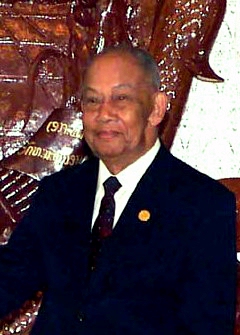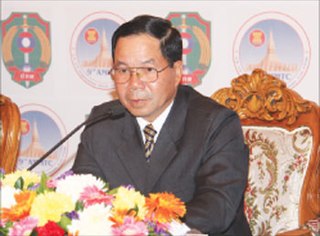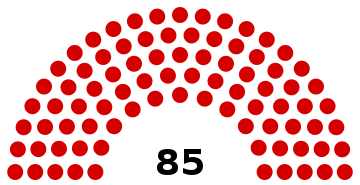
The politics of the Lao People's Democratic Republic takes place in the framework of a one-party parliamentary socialist republic. The only legal political party is the Lao People's Revolutionary Party (LPRP). The head of state is President Thongloun Sisoulith, who is also the LPRP general secretary, making him the supreme leader of Laos. The head of government is Prime Minister Phankham Viphavanh.

Kaysone Phomvihane was the first leader of the Communist Lao People's Revolutionary Party from 1955 until his death in 1992. After the Communists seized power in the wake of the Laotian Civil War, he was the de facto leader of Laos from 1975 until his death. He served as the first Prime Minister of the Lao People's Democratic Republic from 1975 to 1991 and then as the second President from 1991 to 1992.

The Lao People's Revolutionary Party (LPRP) is the founding and sole ruling party of the Lao People's Democratic Republic. The party's monopoly on state power is guaranteed by Article 3 of the Constitution of Laos, and it maintains a unitary state with centralised control over the economy and military.

General Khamtai Siphandone is a Laotian politician who was Chairman of the Lao People's Revolutionary Party from 24 November 1992 to 21 March 2006 and President of Laos from 24 February 1998 to 8 June 2006, when he was replaced by Choummaly Sayasone. He was a member of the Communist Party of Indochina in 1954 and a member of the Central Committee of the Lao People's Revolutionary Party in 1956.

Laos elects a legislature nationally and the public also participates in the election of village heads. The National Assembly has 164 members, elected for five year terms.

The Prime Minister of the Lao People's Democratic Republic, formerly the chairman of the Council of Government of the Lao People's Democratic Republic, is the head of government of Laos. The highest position in the government, they direct the country's executive branch. The prime minister is accountable to the president, the National Assembly and the country's only legal party: the Lao People's Revolutionary Party (LPRP). The current prime minister is Sonexay Siphandone, who was elected in 2022.

Lieutenant General Choummaly Sayasone is a Laotian politician who was General Secretary of the Lao People's Revolutionary Party (LPRP) and President of Laos from 2006 to 2016.

The National Assembly is the unicameral parliament of Laos. The National Assembly meets in Vientiane.

Laos–Vietnam relations refers to the current and historical relationship between the Lao People's Democratic Republic and Socialist Republic of Vietnam.

Parliamentary elections were held in Laos on 30 April 2011. The ruling Lao People's Revolutionary Party (LPRP) won 128 of the 132 seats in the National Assembly.

Parliamentary elections were held in Laos on 30 April 2006. The ruling Lao People's Revolutionary Party (LPRP) won 113 of the 115 seats in the sixth National Assembly.

Parliamentary elections were held in Laos on 24 February 2002. The ruling Lao People's Revolutionary Party (LPRP) won all 109 seats in the National Assembly.
Asang Laoly is a retired Lao politician, Major General, and member of the Lao People's Revolutionary Party (LPRP). While he was the Deputy Prime Minister of Laos from 2002 to 2016, he also held a number of leadership positions in both the government and in LPRP.

Thongbanh Sengaphone was a Laotian politician and member of the Lao People's Revolutionary Party (LPRP). He served as Minister of Public Security and concurrently held seats in the LPRP's Central Committee and the Secretariat.

Parliamentary elections were held in Laos on 26 March 1989, the first since 1972 and the first since the Communist takeover in 1975.

Parliamentary elections were held in Laos on 21 December 1997. A total of 159 candidates contested the 99 seats, all but four of which were Lao People's Revolutionary Party members. All candidates were pre-screened by the LPRP. The LPRP won 98 seats, with an independent winning the remaining seat. Voter turnout was reported to be 99.4%.
The 9th Congress of the Lao People's Revolutionary Party (LPRP) was held in Vientiane from 17–21 March 2011. The congress occurs once every five years. A total of 576 delegates represented the party's 191,700 card-carrying members.
Operation Booster Shot was a rural aid program run by the United States in the Kingdom of Laos between March and April 1958. Its purpose was to influence Lao peasantry to vote during May National Assembly elections for those politicians the U.S. favored. Because of the lack of roads in Laos, Booster Shot became an air delivery operation. It proceeded somewhat haphazardly due to rushed planning. Although logistically successful, the result was an electoral victory by the communist candidates opposed to the U.S..

Parliamentary elections were held in Laos on 20 March 2016. Voters were presented with a single list from the Lao Front for National Construction, dominated by the Communist Lao People's Revolutionary Party (LRPP). The LPRP won 144 of the 149 seats, with pro-government independents winning the remaining five.

Parliamentary elections were held in Laos on 21 February 2021 to elect the members of the ninth National Assembly. Provincial elections took place simultaneously.











